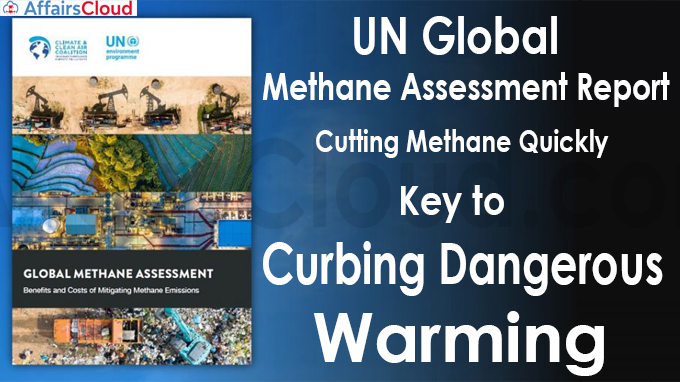
- It will also help countries to keep close with the Paris Climate Agreement’s goal of limiting global temperature rise to 1.5°C.
- A 45% Methane reduction will prevent around 2, 60, 000 premature deaths and 7,75,000 asthma-related hospital visits annually, 25 million tonnes in crop losses & 73 billion hours of lost labour from extreme heat.
- The report states that around 60% of methane comes from human activity, the remaining from wetlands and natural sources.
Key Points
i.Methane is a powerful greenhouse gas and is responsible for around 30% of global warming since the pre-industrial era.
- It accounts for around one-fifth of global greenhouse gas emissions.
- The majority of human-caused methane emissions come from 3 sectors – fossil fuels (35%), landfills and waste (20%), and agriculture (40%).
- Even during the COVID-19 pandemic, the amount of methane in the atmosphere reached record levels in 2020.
ii.The potential to reduce methane emissions varies country-wise. In India & Europe methane is emitted mostly from the waste sector.
iii.Factors like the shift to renewable energy, residential and commercial energy efficiency, reduction in food loss and waste can reduce methane emission by a further 15% by 2030.
Climate and Clean Air Coalition
Established in 2012 it is a voluntary partnership of governments, intergovernmental organizations, scientific institutions and others to protect the climate and improve air quality.
- It has 71 state partners and 78 non-state partners. India also joined CCAC in 2019.
- CCAC’s Secretariat is hosted by the United Nations Environment Programme (UNEP) in Paris, France.
Recent Related News:
i.December 10, 2020, According to 11th Edition of Emissions Gap Report 2020 (Annual report) released by United Nations Environment Programme (UNEP), The Global CO2 (Carbon Dioxide) Emissions are set to fall by 7% in 2020 owing to Pandemic.
About Climate and Clean Air Coalition (CCAC)
Head of CCAC Secretariat – Helena Molin Valdés
Headquarters – Paris, France
About United Nations Environment Programme (UNEP)
Executive Director – Inger Andersen
Headquarters – Nairobi, Kenya